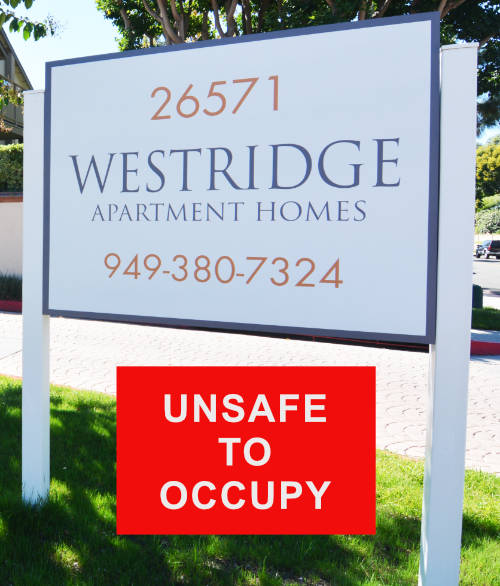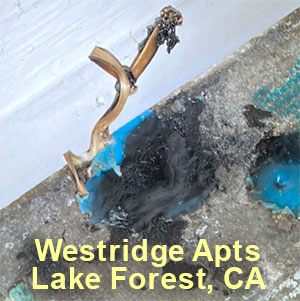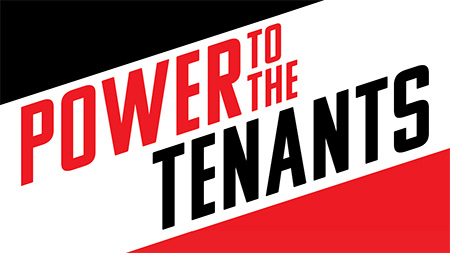
Mold is making people sick!
Don't be duped into renting an apartment until you check for mold first by testing the unit for excessive moisture. Click on PDF icon to learn how. If moisture is found, mold may be hiding!


Moisture-mold connection
The massive amount of rain in the recent past has caused the OC soil to expand resulting in extensive damage to foundations under Orange County homes, apartments, and other structures, including an explosion of mold under the flooring. Rooftops have also become saturated with rain moisture that has leaked down into walls and around windows. Sprinkler systems continue to add to this problem daily by providing the moisture "fuel" for mold to flourish. Where you have moisture, mold is guaranteed.

Rent-reduction leverage
OC apartment companies are leasing 'substandard' apartments that do not meet California's Health and Safety Code 17920.3—they are operating in violation of the law and are hiding this from tenants! If you are paying full "market" rent for a substandard apartment, you are getting ripped off! Other apartment complexes—such as those owned by the Irvine Company—have made concessions to their tenants who discover the mold issue in their apartments so do your homework—spend time on this site and get educated about the problem and how you can use this info to lower your rent.

Before you sign/renew
When shopping for an apartment, prospective OC's tenants can now check if a complex has a mold problem BEFORE a yes/no rental decision is made by checking the mold registry on the home page of this site to see if the complex they are interested in renting from is on the list. If it is, renters can use this information to negotiate a break on rent, which the Irvine Company has offered to their tenants to try to keep them quiet about their mold problem (see article on the home page bottom). If you are considering renewing your lease, you can use this apartment mold list in the same way to negotiate a lower-cost renewal. This registry now gives renters an opportunity to make a more-informed rental decision BEFORE they sign a lease, instead of discovering the mold problem afterwards. For those who may be willing to take the risk of renting a moldy apartment, a rent concession may be available.

Beware of leasing-office lies and language
Thanks to California State Law (California Senate Bill 655), landlords MUST provide tenants with a habitable place to live (no mold or dampness) REGARDLESS OF WHAT THEIR LEASE SAYS or face penalties; landlords cannot use their own lease "language" to circumvent State Law. If landlords try to enforce their own rules with bogus lease language to avoid having to make repairs, they could be fined. If your landlord fails to provide a moisture and mold-free property for you to occupy, tries to deny the problem exists, or tries to blame you for causing the problem, remind them that lawyers/advocates who often don't charge up front to take tenant cases are just a phone call away. The latest leasing-office tactic to duck the mold problem: Claiming that mold is really "mildew" to deceive tenants.

Lease "escape" clause
Many tenants who rent apartments, condos, and homes never suspect that these places contain toxic mold, but many of these places in Orange County do. And if tenants and/or their children have asthma, eczema (skin rash) or other health issues, these conditions could worsen in a moldy environment. What's important to remember is that mold isn't always visible to the naked eye; mold likes to grow in dark and moist environments, such as under flooring and inside walls. In the event you do decide to lease a moldy apartment, make sure that there is a clause in your lease that will let you out without any penalties if the mold situation worsens, which it could over the lifetime of your lease. Asking for a month-to-month agreement may be the best option to explore so that in the event you or a family member becomes ill from exposure to the mold, you are not stuck in a long-term lease.

Damaged possessions
Many leasing companies have a mold addendum in which they expressly prohibit you from bringing in any possessions which have been exposed to mold. However, many of these same complexes are mold generators, mold which can damage new possessions purchased by tenants to furnish their new apartments. When new furniture is exposed to mold, taking it to another place may not be possible in cases where landlords test furniture and other possessions before they allow them into their living areas. In cases where you have moved into a moldy apartment without prior knowledge of the mold, your existing landlord can be held responsible for their mold damage to your new possessions.

Get in their face and stand your ground!
If your landlord says, "You have to deal with the mold—it's in your lease", this is a lie! Get in their face and point out that per California Senate Bill 655, landlords have a legal requirement in California to provide a habitable place to live free of moisture and mold REGARDLESS of what lease language says. Use Google to do your research and then put your leasing office on notice that you are in charge of the situation and not them. Don't let leasing management BS or "bully" you into submission. If you think you have been medically harmed by mold in your apartment, email us above to see if you may be eligible for recovery. Remember this: Your leasing office doesn't care about your health or safety. All they care about is getting your rent check! Watch for the lies above to get you to go away.
